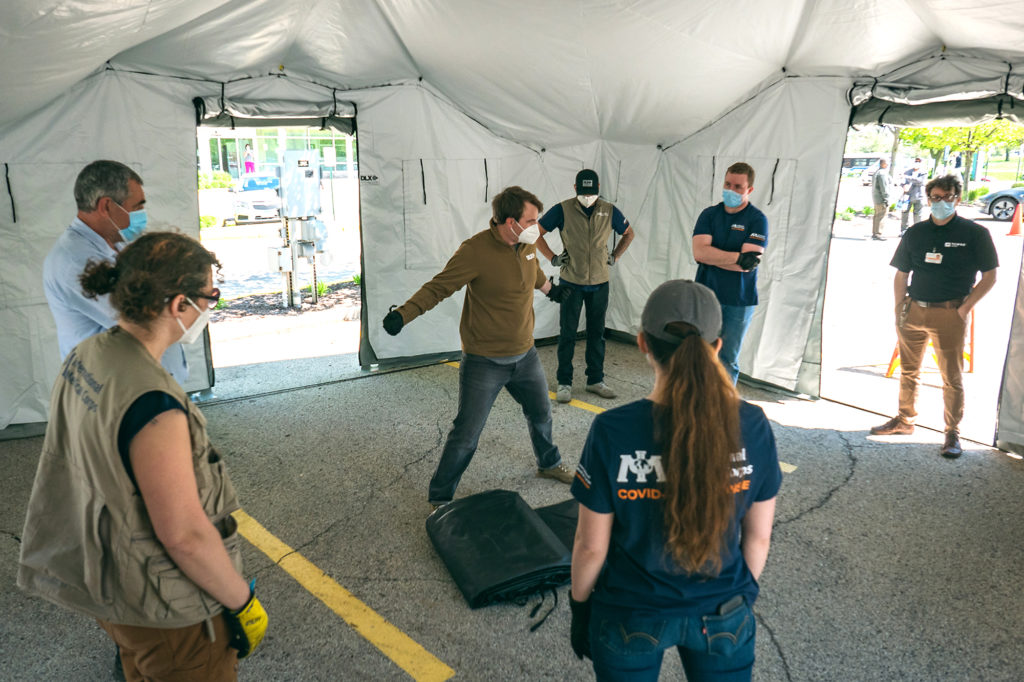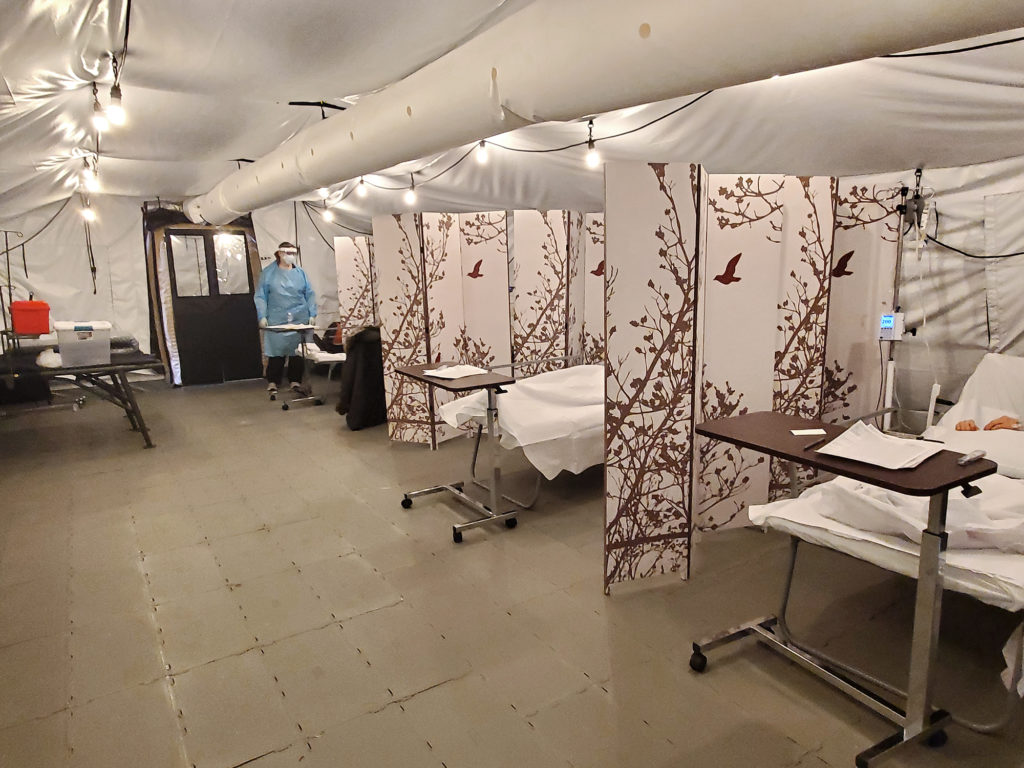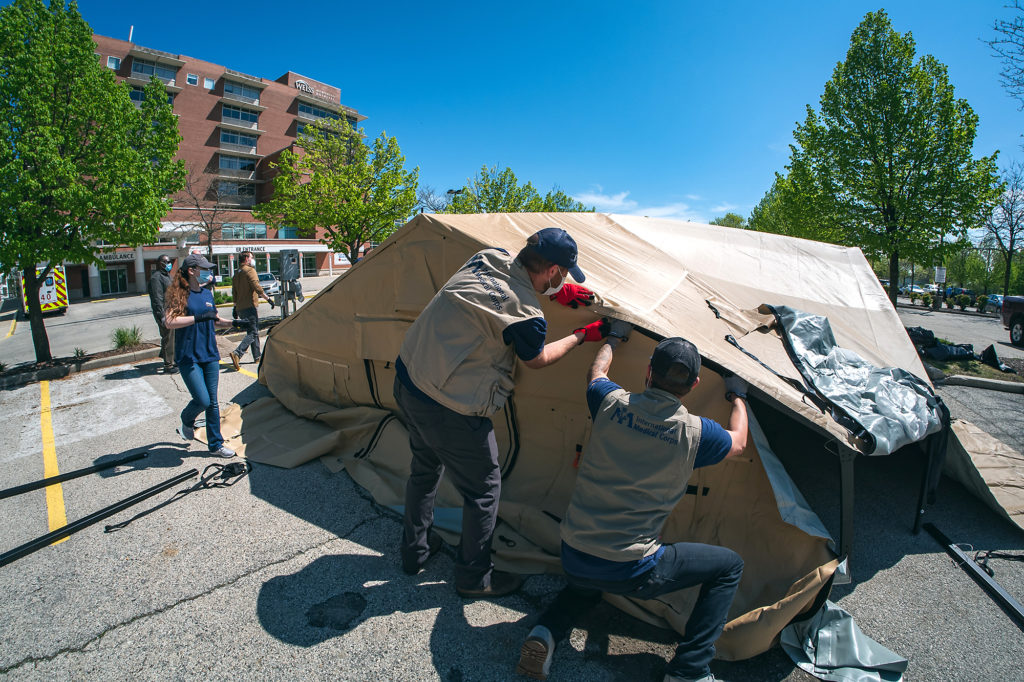When COVID-19 shook our world in the spring of 2020, the medical community had to scramble to catch up. In those urgent early days, as states across the US struggled to assemble mass testing sites, hospitals coped with staggeringly high patient loads. As part of our biggest emergency response to date, International Medical Corps deployed 29 emergency medical field units across the US to give underserved, overwhelmed hospitals the extra space they needed to serve critical COVID patients.

Weiss Memorial Hospital in Chicago received one of these medical tents from International Medical Corps in May. The hospital, located in the thick of urban Chicago in a gentrifying community that hosts a significant homeless and underinsured population, was hit hard by COVID-19 in the spring, due to the large number of nursing homes in the area. “We had no bed availability at all and had to open up portions of the hospital that would normally not house patients,” says Dr. Suzanne Pham, Weiss’s COVID-19 medical director. “Functioning at full capacity for two months straight was very, very hard on our hospital.”
The donation from International Medical Corps proved to be “a tremendous help” in providing extra capacity, both because of the additional space the tent provided and the accompanying materials that made it fully operational, such as cots, monitoring equipment, HEPA filters and more.
“As a small community hospital, I just didn't think that we would ever get this sort of attention. But because of International Medical Corps’ support, we have finally been able to provide the higher standard of care that I always wanted for our patients.
Dr. Suzanne Pham, Weiss’s COVID-19 medical director
The tent started off as a safe environment for COVID testing, but over the past few weeks has transformed into an area used for infusions of a recently approved treatment: monoclonal antibodies known as Bamlanivimab and Casirivimab/Imdevimab. The “most effective COVID-19 prevention measure we’ve seen to date” according to Dr. Pham, these antibodies contain a manufactured protein designed to impede the spike protein of COVID-19, suppressing the virus’s ability to replicate. The mother of a medical resident at Weiss who is in charge of critical COVID cases in the hospital’s intensive-care unit was the first patient to receive and antibody infusions in the tent—and her health has significantly improved. “Every patient that we have infused has done quite well,” says Dr. Pham. “I call them 48 hours after the infusion and 100% have said, ‘I feel dramatically better.’”
Weiss was the first hospital in Chicago to be able to do the infusions, which Dr. Pham credits to having the International Medical Corps tent. She reports that the other hospitals in the area that received antibodies from the federal government are still trying to figure out how to safely bring known COVID-positive patients into their environments to give them the antibodies. “But for us it was just seamless, because we had a dedicated environment already ready to go,” says Dr. Pham. “We are so proud that we’ve been able to be the first hospital in Chicago to do this—and it absolutely was only because of the donation.”

Dr. Pham’s gratitude for the support from International Medical Corps stems in large part from the absolute exhaustion she and her colleagues feel serving on the frontlines of this pandemic. “The first surge was very, very tough for the entire medical community at large, because we didn’t know what we were dealing with and everyone was afraid for their patients, seeing them progress so rapidly and not knowing how to help them,” she says. “That emotional impact, coupled with the physical toll, led many people to step away from medicine during that time, leaving more responsibility on the shoulders of those who did remain actively at the bedside caring for COVID patients.”
Today, Weiss is seeing an increasing number of cases—this time in much younger patients, who are developing severe to critical symptoms. But Dr. Pham feels the hospital is much more prepared to respond this time around, thanks to its partnership with International Medical Corps. “This partnership is something that I’ve come to really cherish, and it’s helped me feel hope that—by having organizations like International Medical Corps partner with our hospital—we can really help so many people get through this,” she says. “And now, having the antibody infusions as a way to prevent the need for hospitalization, I see even more light at the end of the tunnel here.”
To learn more about International Medical Corps’ efforts to fight COVID-19 in the US and around the world, visit InternationalMedicalCorps.org/COVID19.
